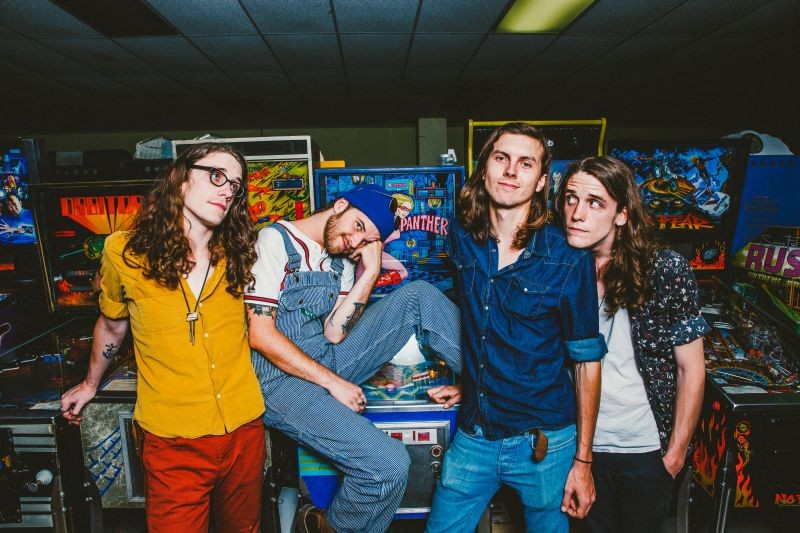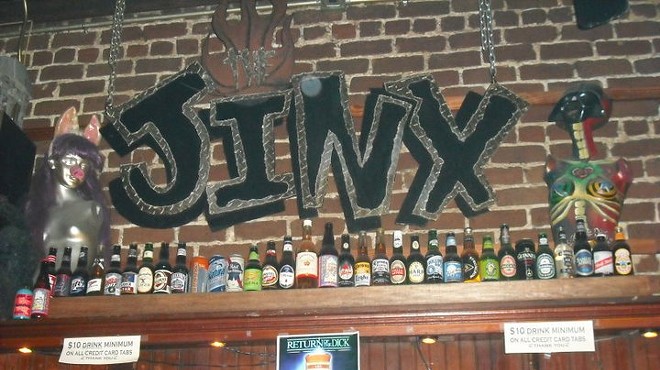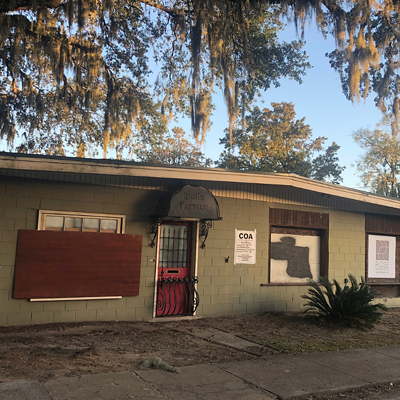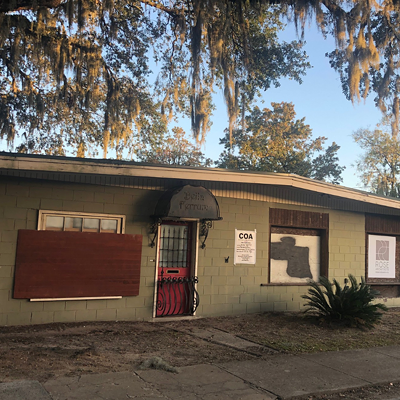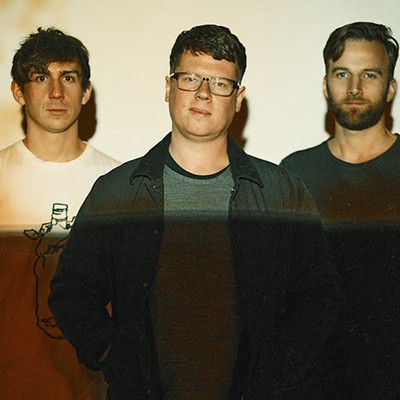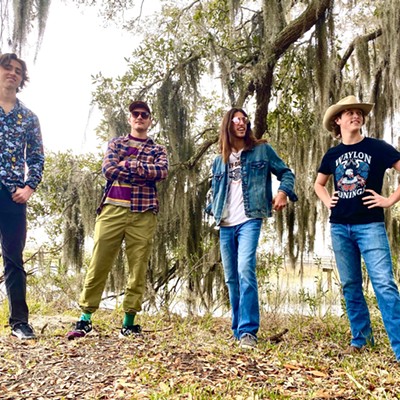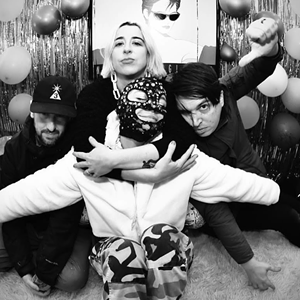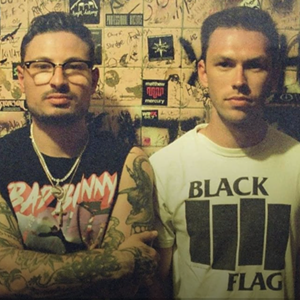SAM WILLIAMS has spent his day lugging carpet under the blazing summer sun. The Weeks’ guitarist is in the midst of an engrossing project with roommate and Weeks’ guitarist Johny Fisher: transforming their basement into a studio/rehearsal area, complete with a stage. With every Weeks member living on the same street, having a creative hub where everyone can leave their gear will be a dream, but they’re gonna have to work for it.
“It’s too hot to be doing all this,” Williams laughs, fresh off a Home Depot run.
There are a few more hardware store trips to be made before the band embarks on a Southeast tour. But even if time off the road is spent doing manual labor, the members of The Weeks value those few-and-far-between breaks.
For ten years, the band of childhood friends has entertained nationwide audiences with their Southern-fried take on no-fuss rock ‘n’ roll. This weekend’s show is their first Hostess City gig in two years, following a lauded performance at 2014’s Savannah Stopover Music Festival.
We chatted with Williams about working on new material, functioning as an independent band, and the magical discovery of a certain long-forgotten hard drive.
You just released a 10-year-old Weeks album. How’d that happen?
It’s from 2006, and just due to some weird circumstances, we ended up re-recording three of them and took six songs off. There’s still a handful of songs from the first record that we’re still hiding.
Is this never-before-heard material?
It was available for one month when we were in high school—we weren’t touring, there wasn’t any Spotify, it wasn’t on iTunes. I think it was available for three, four shows in 2006!
We worked on this record three or four weeks after our first band practice. We had three or four songs and said, ‘Let’s do an EP.’ This guy—surreal name, Mischa Hercules—this 20-year-old kid, had a great studio in his mom’s yoga studio. He had the back part of it to himself with great recording gear. We hadn’t really done any records; we were just learning to write and record music all together in that year and a half.
What’s it feel like to put those songs out there a decade later?
It’s weird! We have all the context—we know how old we were, the circumstances. We were losing ourselves in it as 14, 15-year-olds—given the context, this is pretty good. It’s a 10-year-old record. But you say, ‘You know what? Fuck the context. This is really good!’
We definitely have songs we’re more proud of than those, but that was one of the proudest moments of the last decade. It’s always good when you’re 10 years down the road to remember, this is the same four dudes the whole way. There’s a lot of nostalgia. It re-energizes you. We kind of lost the recordings, we weren’t even sitting on it; nobody had CDs of it. Computers crashed and we forgot about it entirely.
How’d you get ahold of the recordings?
One of my old hard drives had crashed, I was looking for some other Jackson, Mississippi band’s music on there—pretty sure it was this band Champagne Heights—I did the GeekSquad thing, they restored it, and there it was: ‘Holy shit! This is the first record!’ It wasn’t even the rough mixes—it was the final masters.
You spent 2015 writing new material. How’s the next album coming?
We have a new record, it’s done right now. It’s like 30 songs...we’re in the process of picking and choosing 10-12 songs, and it will probably be out in February next year. It’s been four years since the last album. We’ve been writing more because there’s nothing like a four-year break between releases to make you say, ‘We can never do that again.’ Once this record comes out, we’re going to be putting out a record every year.
Why a four-year break?
We toured Dear Bo [Jackson] for a solid two years. We did 4, 500 shows for that record. We had just started recording in late 2014 in the middle of tour and came to the realization that, if we put this record out in six months, we're going to do another two years of touring. Then we'd be nearing 700 shows. In those two years, the longest we were home, not working, was 20 days.
So we recharged our batteries a bit. Writing and recording on tour is not the wisest decision—tension’s always high. We’re a band of brothers. We’re not PC, everybody-loves-everybody; we gripe with the best of ‘em. It wouldn’t have been a healthy thing.
We hunkered down at my house, having sleepovers four nights a week, grilling out and trying to get back to the old days when we didn’t have a big schedule. We just said, ‘Let’s just hang out, drink beers, smoke, and eat steak and write whatever we want to.’ It takes the pressure off. It’s important to know when to pump the breaks.
So you were recording around the time you found those early recordings. Did that affect you in the studio, hearing that early work?
Finding that did, and outside of that, Dear Bo, for us, was sort of experimental. We'd figured out early on that we were all about loud, fast, hard. Then we were like, 'Okay, we're really good at that. We need to challenge ourselves. Let's throw the kitchen sink at this, let's do horn sections, clean guitars, write pretty songs. Let's get good at this mid-tempo, more spacious thing.' For this record, it was like, 'Cool, we got good at that. Let's see if we can combine them.'
We wanted like, when a beginner guitar player hears the record, to say, ‘I’ll learn this song because it’s easy,’ and you pick it up and it’s really hard. Complex music with the veneer of simplicity.
How are you releasing the album?
We might be going the self-release route. I’ve been fascinated with that. The model of this industry has been changing so much, we’ve been doing it for so long and we’re really entrenched in watching other artists and learning how they’re doing things. We like to have all hands in the pot—we’re a bunch of creative dudes, but also, we’ve run our own business for a while. We went a year without management, to take a step back and say we need to get everything figured out by ourselves so we’re entirely accountable for everything.
In rock ‘n’ roll, sometimes things don’t work out and it’s easy to say, ‘It’s our agent’s fault,’ ‘It’s management’s fault.’ We need to take a break and say, ‘This is us. If it doesn’t happen, it’s our own fault.’ Even if we’ve got a 20-person team, we have to be the hardest-working people, and it’s all on us. We learned a lot. We’re excited to put this album out by ourselves. We’ve been with a bunch of labels; we’ve seen what works and doesn’t work. We’re ready to give it a shot.

